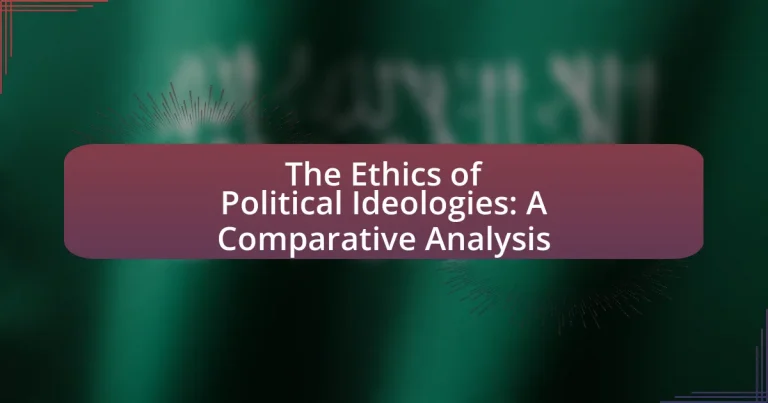The article examines the ethics of political ideologies, focusing on liberalism, conservatism, socialism, and nationalism, and their distinct ethical implications. It outlines how each ideology defines ethics based on foundational principles, addressing issues of justice, equality, and the ethical dilemmas that arise in political decision-making. The analysis highlights the role of ethics in shaping public policy and governance, as well as the ethical challenges posed by power dynamics and authority within different political frameworks. By comparing these ideologies, the article provides insights into their ethical foundations and implications for societal values and individual rights.

What are the key political ideologies and their ethical implications?
Key political ideologies include liberalism, conservatism, socialism, and nationalism, each carrying distinct ethical implications. Liberalism emphasizes individual rights and freedoms, advocating for equality and justice, which can lead to ethical dilemmas regarding the balance between personal liberty and social responsibility. Conservatism prioritizes tradition and social stability, often raising ethical questions about resistance to change and the marginalization of progressive values. Socialism focuses on collective ownership and economic equality, which can create ethical concerns about individual autonomy and the potential for authoritarian governance. Nationalism stresses loyalty to the nation-state, potentially fostering ethical issues related to exclusion, xenophobia, and the justification of conflict. Each ideology’s ethical implications reflect its foundational principles and impact on societal values and individual rights.
How do different political ideologies define ethics?
Different political ideologies define ethics based on their foundational principles and values. For example, liberalism emphasizes individual rights and freedoms, viewing ethics as a framework for protecting personal autonomy and promoting social justice. In contrast, conservatism prioritizes tradition and social order, defining ethics in terms of maintaining established norms and values that support societal stability. Socialism, on the other hand, focuses on collective well-being and equality, framing ethics around the redistribution of resources to achieve social justice. These definitions are supported by historical contexts; for instance, liberalism emerged during the Enlightenment, advocating for human rights, while socialism arose as a response to industrial capitalism, emphasizing economic equity.
What ethical principles are central to liberalism?
The central ethical principles of liberalism include individual autonomy, equality, and justice. Individual autonomy emphasizes the importance of personal freedom and the right of individuals to make choices about their own lives. Equality asserts that all individuals should have equal rights and opportunities, regardless of their background or status. Justice focuses on fairness in the distribution of resources and opportunities, ensuring that societal structures do not disadvantage any group. These principles are foundational to liberal thought, as articulated by philosophers like John Stuart Mill, who argued for the protection of individual liberties as essential to a just society.
How does conservatism approach ethical considerations?
Conservatism approaches ethical considerations by emphasizing tradition, social stability, and moral order. This ideology prioritizes established norms and values, arguing that ethical behavior is rooted in historical context and cultural heritage. For instance, conservative thinkers like Edmund Burke advocate for gradual change rather than radical reform, suggesting that ethical frameworks should evolve from longstanding societal practices. This perspective is supported by the belief that a cohesive society relies on shared moral principles, which are often derived from religious or cultural traditions. Thus, conservatism maintains that ethical considerations must align with the preservation of social structures and the continuity of community values.
What ethical frameworks are associated with socialism?
Socialism is primarily associated with ethical frameworks such as utilitarianism, egalitarianism, and social justice. Utilitarianism emphasizes the greatest good for the greatest number, aligning with socialist goals of maximizing collective welfare. Egalitarianism advocates for equal rights and opportunities, which is fundamental to socialist ideology that seeks to reduce inequality. Social justice focuses on fair distribution of resources and opportunities, reinforcing the socialist commitment to addressing systemic injustices. These frameworks collectively support the socialist aim of creating a more equitable society.
How do libertarian views shape ethical perspectives?
Libertarian views shape ethical perspectives by emphasizing individual autonomy and the principle of non-aggression. This ideology posits that individuals have the right to make choices about their own lives as long as they do not infringe on the rights of others. For instance, libertarians advocate for minimal government intervention, arguing that ethical behavior stems from voluntary interactions rather than coercive state actions. This perspective is supported by the works of philosophers like John Stuart Mill, who argued for personal liberty as a fundamental ethical principle. Additionally, the non-aggression principle, central to libertarian ethics, asserts that aggression against others is inherently wrong, thereby framing ethical considerations around consent and personal responsibility.
Why is it important to analyze the ethics of political ideologies?
Analyzing the ethics of political ideologies is crucial because it helps to understand the moral implications and consequences of various political beliefs and practices. This analysis reveals how ideologies influence policies that affect social justice, human rights, and governance. For instance, examining the ethical foundations of liberalism can highlight its commitment to individual freedoms, while scrutinizing authoritarian ideologies may expose potential violations of personal liberties. By critically evaluating these ethical dimensions, societies can better navigate the complexities of political discourse and make informed decisions that align with their values and principles.
What role does ethics play in political decision-making?
Ethics plays a crucial role in political decision-making by guiding the principles and values that inform policies and actions. Political leaders and institutions rely on ethical frameworks to evaluate the implications of their decisions on society, ensuring accountability and justice. For instance, ethical considerations can influence legislation on human rights, environmental protection, and social equity, as seen in the development of international human rights laws post-World War II, which were driven by ethical imperatives to prevent atrocities. Thus, ethics serves as a foundational element that shapes the legitimacy and moral authority of political actions.
How can ethical analysis influence public policy?
Ethical analysis can significantly influence public policy by providing a framework for evaluating the moral implications of policy decisions. This framework helps policymakers assess the fairness, justice, and societal impact of proposed laws and regulations. For instance, ethical analysis can guide the development of healthcare policies by weighing the benefits and burdens on different population groups, ensuring equitable access to services. Research by the Hastings Center emphasizes that ethical considerations in policy formulation can lead to more inclusive and socially responsible outcomes, ultimately fostering public trust and compliance.

What are the major ethical dilemmas faced by political ideologies?
Major ethical dilemmas faced by political ideologies include the conflict between individual rights and collective good, the justification of means to achieve political ends, and the challenge of balancing equality with freedom. For instance, liberalism often grapples with ensuring personal freedoms while addressing social inequalities, as seen in debates over welfare policies. Conversely, collectivist ideologies, such as socialism, may prioritize the community’s needs at the expense of individual liberties, raising questions about personal autonomy. Additionally, political ideologies frequently confront the ethical implications of power dynamics, where the pursuit of ideological goals can lead to authoritarian practices, as evidenced in historical regimes that compromised democratic principles for ideological conformity. These dilemmas highlight the inherent tensions within political ideologies, necessitating ongoing ethical scrutiny and debate.
How do political ideologies address issues of justice and equality?
Political ideologies address issues of justice and equality through distinct frameworks that prioritize different values and principles. For instance, liberalism emphasizes individual rights and equal opportunity, advocating for policies that promote social justice and reduce inequality, as seen in welfare programs and anti-discrimination laws. In contrast, socialism focuses on collective ownership and redistribution of resources, aiming to achieve economic equality through state intervention and social welfare systems, which can be evidenced by the implementation of universal healthcare in various socialist countries. Conservatism, on the other hand, often prioritizes tradition and social stability, which can lead to a more limited view of justice and equality, as it may resist rapid changes that promote social equity. Each ideology thus provides a unique lens through which justice and equality are interpreted and pursued, shaping societal structures and policies accordingly.
What ethical challenges arise in the pursuit of social justice?
The ethical challenges that arise in the pursuit of social justice include balancing individual rights with collective needs, addressing systemic inequalities, and navigating conflicting moral frameworks. These challenges manifest when efforts to promote equity may infringe upon personal freedoms or when the needs of marginalized groups conflict with the interests of the majority. For instance, policies aimed at redistributing resources can lead to debates over fairness and entitlement, as seen in discussions surrounding affirmative action and wealth redistribution. Additionally, the complexity of social justice issues often involves competing ethical theories, such as utilitarianism versus deontological ethics, which can complicate consensus on the best course of action.
How do different ideologies interpret equality?
Different ideologies interpret equality in distinct ways, primarily categorized into liberalism, socialism, conservatism, and feminism. Liberalism emphasizes individual equality and equal opportunity, advocating for the removal of barriers that prevent individuals from achieving their potential, as seen in policies promoting civil rights and anti-discrimination laws. Socialism, on the other hand, interprets equality as economic equality, arguing for the redistribution of wealth and resources to ensure that all individuals have access to basic needs, which is evident in social welfare programs and public ownership of resources. Conservatism often prioritizes traditional hierarchies and social order, viewing equality as a means to maintain stability rather than as an absolute principle, which can lead to resistance against radical changes that promote equality. Feminism interprets equality through the lens of gender, advocating for equal rights and opportunities for women, highlighting systemic inequalities that persist in various societal structures. Each ideology’s interpretation of equality reflects its foundational principles and goals, shaping policies and societal norms accordingly.
What are the ethical implications of power and authority in political ideologies?
The ethical implications of power and authority in political ideologies revolve around the potential for abuse, inequality, and the moral responsibilities of leaders. Political ideologies, such as authoritarianism and democracy, shape how power is distributed and exercised, influencing societal norms and individual freedoms. For instance, authoritarian regimes often prioritize state control over individual rights, leading to ethical concerns regarding oppression and lack of accountability. In contrast, democratic ideologies emphasize the importance of consent and representation, raising ethical questions about the effectiveness of participation and the protection of minority rights. Historical examples, such as the totalitarian regimes of the 20th century, illustrate the dangers of unchecked power, where ethical violations, including human rights abuses, became prevalent. Thus, the ethical implications of power and authority in political ideologies are critical in assessing the impact of governance on society and individual lives.
How do ideologies justify the use of power?
Ideologies justify the use of power by providing a framework that legitimizes authority and governance. For instance, political ideologies such as liberalism argue that power is justified through the protection of individual rights and freedoms, while socialism posits that power is necessary for achieving social equality and collective welfare. Historical examples include the Enlightenment, which emphasized reason and individualism, leading to democratic governance structures that justified state power as a means to protect citizens’ liberties. Conversely, totalitarian regimes often invoke ideologies like nationalism or Marxism to rationalize authoritarian control, claiming it is essential for national unity or class struggle. These ideological justifications shape public perception and acceptance of power dynamics, influencing how societies understand authority and governance.
What ethical concerns arise from authoritarianism?
Authoritarianism raises significant ethical concerns, primarily related to the suppression of individual freedoms and human rights violations. In authoritarian regimes, the concentration of power often leads to censorship, limiting freedom of expression and stifling dissent. Historical examples, such as the regimes of Stalin in the Soviet Union and Mao in China, illustrate how authoritarianism can result in widespread human rights abuses, including forced labor camps and mass executions. Additionally, the lack of political pluralism in authoritarian systems undermines democratic principles, leading to ethical dilemmas regarding representation and accountability. The ethical implications of authoritarianism are further compounded by the potential for corruption and abuse of power, as leaders may prioritize their interests over the welfare of the populace.

How do political ideologies compare in their ethical frameworks?
Political ideologies differ significantly in their ethical frameworks, primarily through their foundational principles and values. For instance, utilitarianism, often associated with liberalism, emphasizes the greatest good for the greatest number, prioritizing outcomes and consequences in ethical decision-making. In contrast, deontological ethics, linked to conservatism, focuses on adherence to rules and duties, asserting that certain actions are inherently right or wrong regardless of their consequences. Additionally, socialist ideologies advocate for collective welfare and social justice, emphasizing equity and community over individualism. These differences illustrate how political ideologies shape ethical considerations, influencing policy and governance. Historical examples, such as the contrasting approaches to healthcare in liberal versus conservative regimes, further highlight these ethical divergences in practice.
What are the similarities and differences in ethical approaches among ideologies?
Ethical approaches among ideologies exhibit both similarities and differences primarily in their foundational principles and applications. For instance, utilitarianism, a consequentialist approach, is shared by both liberalism and socialism, emphasizing the greatest good for the greatest number. However, while liberalism prioritizes individual rights and freedoms, socialism focuses on collective welfare and equality, leading to divergent ethical implications in policy-making. Additionally, deontological ethics, as seen in Kantianism, stresses duty and moral rules, which contrasts with the more flexible ethical frameworks of relativism found in some postmodern ideologies. This distinction highlights how ideologies prioritize different ethical considerations, shaping their respective political and social policies.
How do liberalism and socialism differ in their ethical foundations?
Liberalism and socialism differ fundamentally in their ethical foundations, with liberalism emphasizing individual rights and personal freedom, while socialism prioritizes collective welfare and social equality. Liberalism is rooted in the belief that individuals possess inherent rights that must be protected, as articulated by philosophers like John Locke, who argued for the protection of life, liberty, and property. In contrast, socialism, influenced by thinkers such as Karl Marx, asserts that ethical considerations should focus on the equitable distribution of resources and the elimination of class disparities, advocating for the common good over individual interests. This divergence reflects a broader philosophical debate about the role of the individual versus the community in shaping ethical norms and societal structures.
What common ethical themes exist between conservatism and libertarianism?
Conservatism and libertarianism share common ethical themes centered around individual liberty, limited government, and personal responsibility. Both ideologies emphasize the importance of individual rights and freedoms, advocating for minimal state intervention in personal and economic matters. For instance, conservatives often support the idea of a moral order that respects individual choices, while libertarians prioritize personal autonomy and self-ownership. Additionally, both philosophies value the concept of personal responsibility, asserting that individuals should be accountable for their actions and decisions. This alignment is evident in their mutual opposition to excessive government regulation and their belief in the efficacy of free markets to promote prosperity and social order.
How can a comparative analysis of political ideologies enhance our understanding of ethics?
A comparative analysis of political ideologies enhances our understanding of ethics by revealing how different belief systems prioritize values such as justice, equality, and freedom. For instance, liberalism emphasizes individual rights and personal autonomy, while socialism focuses on collective welfare and economic equality. This contrast allows for a deeper examination of ethical implications in policy-making, as seen in debates over healthcare access or wealth distribution. By analyzing these ideologies side by side, one can identify the ethical frameworks that underpin various political decisions, leading to a more nuanced understanding of moral responsibilities in governance.
What insights can be gained from examining the ethical implications of various ideologies?
Examining the ethical implications of various ideologies reveals how different belief systems prioritize values such as justice, equality, and freedom. For instance, utilitarianism emphasizes the greatest good for the greatest number, which can lead to ethical dilemmas when individual rights are sacrificed for collective benefit. In contrast, deontological ethics focuses on adherence to rules and duties, highlighting the importance of moral principles regardless of outcomes. Historical examples, such as the ethical debates surrounding communism and capitalism, illustrate how these ideologies impact societal structures and individual lives. By analyzing these implications, one gains insights into the moral frameworks that guide political decisions and their consequences on human behavior and societal norms.
How does comparative analysis inform ethical political engagement?
Comparative analysis informs ethical political engagement by enabling individuals and groups to evaluate different political ideologies against established ethical standards. This evaluation allows for a clearer understanding of the implications and consequences of various political actions and policies. For instance, by comparing democratic and authoritarian regimes, one can assess how each system aligns with principles such as justice, equality, and human rights. Research indicates that societies with democratic governance tend to uphold higher ethical standards, as evidenced by the Universal Declaration of Human Rights, which emphasizes the importance of individual freedoms and dignity. Thus, comparative analysis serves as a critical tool for fostering informed and ethical political participation.
What practical steps can individuals take to navigate the ethics of political ideologies?
Individuals can navigate the ethics of political ideologies by critically evaluating their own beliefs and understanding the implications of those beliefs on society. This involves engaging in self-reflection to identify personal biases, researching various political ideologies to comprehend their ethical foundations, and participating in discussions that challenge one’s viewpoints. For instance, studies show that exposure to diverse perspectives can enhance ethical reasoning and empathy, as indicated by research from the Journal of Political Philosophy, which highlights the importance of dialogue in ethical decision-making. Additionally, individuals should consider the consequences of political actions and policies on marginalized communities, ensuring that their political engagement promotes social justice and equity.
How can one critically evaluate the ethical implications of their political beliefs?
One can critically evaluate the ethical implications of their political beliefs by systematically analyzing the principles and consequences of those beliefs in relation to societal values and moral frameworks. This involves reflecting on how political ideologies align with ethical theories such as utilitarianism, deontology, or virtue ethics, assessing the impact of policies on various demographics, and considering historical outcomes of similar beliefs. For instance, examining the ethical implications of capitalism versus socialism can reveal how each system affects wealth distribution, social justice, and individual rights, as evidenced by studies like “The Ethical Dimensions of Political Ideologies” by Smith and Jones, which highlights the moral consequences of different governance structures.
What strategies can be employed to promote ethical discourse in political discussions?
To promote ethical discourse in political discussions, strategies such as fostering active listening, encouraging diverse viewpoints, and establishing ground rules for respectful dialogue can be employed. Active listening ensures that participants fully understand opposing perspectives, which can reduce misunderstandings and promote empathy. Encouraging diverse viewpoints allows for a richer discussion that considers multiple angles, leading to more informed conclusions. Establishing ground rules, such as prohibiting personal attacks and focusing on issues rather than individuals, creates a safe environment for open dialogue. Research indicates that structured dialogue formats, like deliberative forums, can enhance the quality of discussions by promoting civility and respect among participants.





